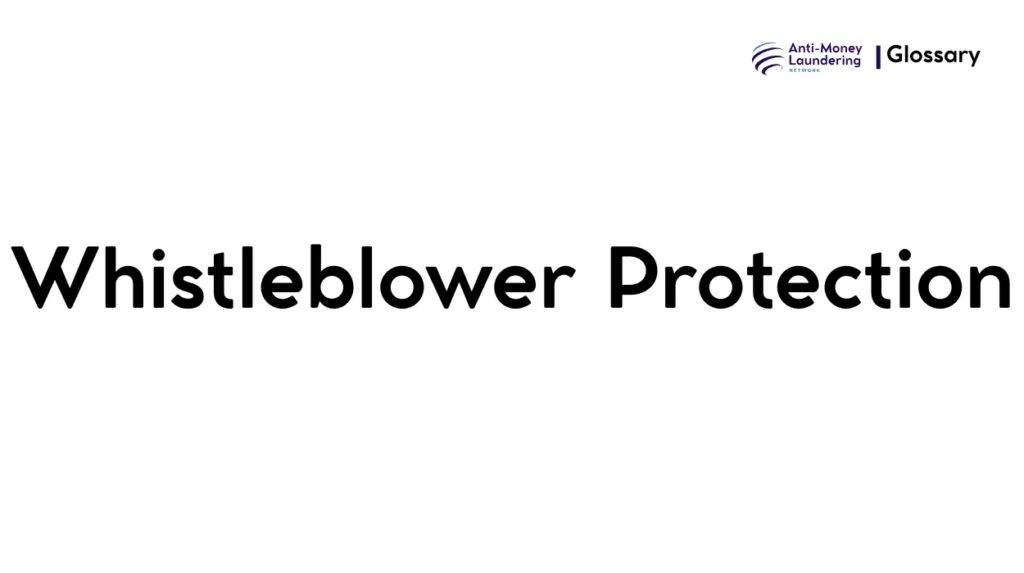Definition
Whistleblower Protection in Anti-Money Laundering (AML) refers to the legal and procedural safeguards designed to protect individuals who report suspicious money laundering activities or violations of AML laws from retaliation by their employers or others. These protections enable individuals to disclose wrongdoing related to financial crimes confidently, without fear of adverse employment consequences or personal harm.
Purpose and Regulatory Basis
Whistleblower Protection plays a critical role in the AML framework by encouraging the early detection and reporting of illicit financial activities, which are often concealed within complex systems. Protecting whistleblowers incentivizes transparency and supports regulatory enforcement. Key global and national regulations establishing these protections include:
- The Financial Action Task Force (FATF) Recommendations, which emphasize the importance of protecting those who report suspicious transactions.
- The USA PATRIOT Act and the Anti-Money Laundering Act (AMLA) of 2020 in the United States, which include explicit whistleblower protection provisions.
- The European Union’s Directive (EU) 2019/1937, requiring confidential channels and protection against retaliation for whistleblowers.
When and How it Applies
Whistleblower Protection applies when an individual reports:
- Potential violations of AML laws such as the Bank Secrecy Act, money laundering conspiracies, or related financial crimes.
- Suspected breaches of sanctions or terrorist financing laws.
Typical scenarios include employees noticing suspicious transactions, auditors uncovering compliance lapses, or insiders reporting misconduct to authorities or internal compliance units. Protections apply during and after reporting, extending to participation in investigations or legal proceedings.
Types or Variants
Whistleblower protections may vary by jurisdiction but generally include:
- Internal Reporting Protections: Safe channels for employees to report within their institutions.
- External Reporting Protections: Protection when reporting directly to regulatory bodies, law enforcement, or government entities.
- Anonymous Reporting: Systems enabling confidentiality and anonymity to reduce fear of retaliation.
Procedures and Implementation
Institutions must establish the following to comply:
- Robust Reporting Systems: Secure, confidential, and accessible channels for whistleblowing, including anonymous options.
- Clear Policies: Documented anti-retaliation policies communicating protections and procedures.
- Training Programs: Regular staff education on whistleblowing rights, obligations, and protections.
- Investigation Protocols: Procedures to handle reports impartially and protect whistleblowers throughout.
- Monitoring and Audit: Ongoing oversight to detect and address retaliation attempts.
Impact on Customers/Clients
From a customer perspective, whistleblower protections ensure individuals can report suspicious activities confidentially, fostering trust and compliance. Customers must understand their rights to make protected disclosures and the institution’s duty to maintain confidentiality and prevent adverse consequences.
Duration, Review, and Resolution
Protections typically endure as long as the individual engages in protected activity and often for a period afterward. Institutions are expected to regularly review whistleblower procedures and outcomes to ensure effectiveness, compliance, and timely resolution of reports.
Reporting and Compliance Duties
Financial institutions and designated non-financial businesses must:
- Maintain records of whistleblower reports and actions taken.
- Prevent and respond promptly to retaliation.
- Ensure alignment with applicable laws and regulatory guidance.
- Report internally to compliance committees and externally, as required.
Failure to implement protections can lead to legal penalties and reputational damage.
Related AML Terms
Whistleblower Protection intersects with:
- Suspicious Activity Reporting (SAR): Channels through which suspicious transactions are reported.
- Compliance Programs: Frameworks that incorporate whistleblowing policies.
- Due Diligence: How whistleblower tips may trigger enhanced customer scrutiny.
Challenges and Best Practices
Challenges: Fear of retaliation, cultural stigmas against reporting, unclear procedures, and lack of anonymity.
Best Practices: Creating a strong ethical culture, guaranteeing confidentiality, providing whistleblower incentives, and enforcing strict anti-retaliation policies.
Recent Developments
- Increased incorporation of technology such as encrypted online portals and AI tools to support anonymous reporting.
- Expanded legal frameworks strengthening protections and introducing whistleblower reward programs.
- Growing international harmonization and enforcement actions bolstering whistleblower roles in AML.
Whistleblower Protection is a cornerstone of effective AML compliance, empowering individuals to safely report illicit financial activities. By enforcing robust protections, financial institutions can enhance crime detection, fulfill regulatory obligations, and foster a culture of compliance essential for combating money laundering globally.

